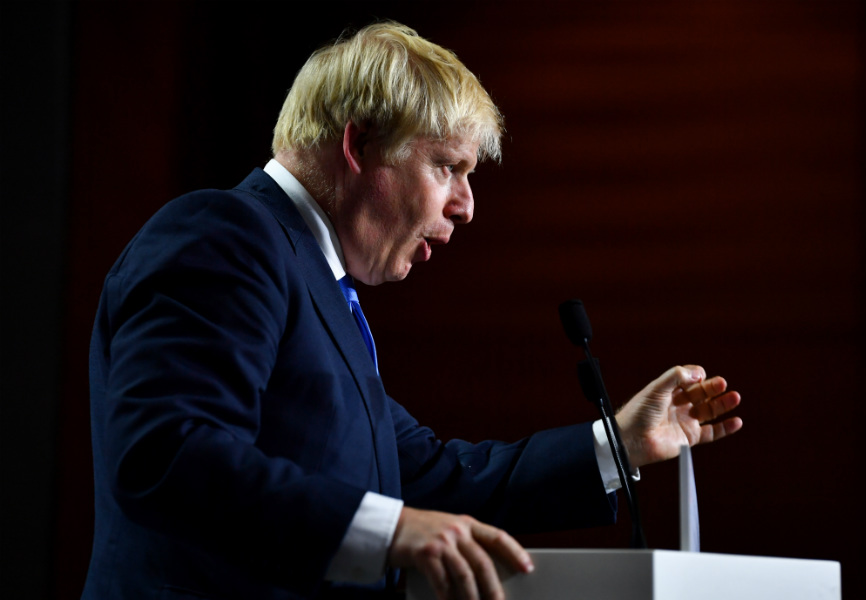On Wednesday,
Prime Minister Boris Johnson moved to suspend the UK's parliament shortly after lawmakers return from their summer recess in early September. Queen Elizabeth has approved the request for a suspension, though royal assent is largely considered a formality.
Johnson aims to stop his political opponents from forcing him to request another Brexit extension to avoid a
no deal exit from the European Union on 31 October.
Why it matters:
Since
Boris Johnson secured the premiership in July, he has been trying to do one thing—convince EU leaders that he is serious about a no deal Brexit, in the hopes that they would be willing to renegotiate the Theresa May deal and secure better terms for the UK (and a political victory for himself). EU leaders have rebuffed those efforts, but Johnson's allies believe that they've been undercut by Brussels counting on British MPs blocking the no deal effort.
That's a risky calculation, as EU leaders have plenty of incentive to refuse to re-open Brexit negotiations themselves—the economic hit to the UK will be much larger than it will be to the rest of the bloc's 27 other members collectively. They also have to worry about setting a dangerous precedent for other countries who also have flirted with the idea of going solo and to retain the cohesiveness of the union going forward. Capitulating to British demands to renegotiate would cause no shortage of political drama on the continent, and with little upside.
Meanwhile,
there is a majority of British parliamentarians who refuse to accept a no deal Brexit, and plans were in the works to use parliament's return from summer recess next week to prevent that exact scenario from happening. Jeremy Corbyn, the far-left leader of the center-left Labour Party, has been trying to see if there was sufficient support for him to call a no confidence vote, collapse the current government, and lead a caretaker government until
new elections could be held (with Labour pushing for a second referendum if voted into power).
There was little traction for this idea
among the British public but more importantly from MPs for whom propelling Corbyn to 10 Downing Street would be almost as bad as a no deal Brexit. A cross-party group of MPs instead decided to use legislative maneuvers to prevent a no deal Brexit by forcing Johnson to ask the EU
for another extension. Johnson and his team see that as weakening whatever leverage they believe they have with the EU and, rather than let this scuttle their game of chicken with Brussels, have moved to suspend parliament shortly after it comes back into session early next week.
What happens next:
In short, a constitutional crisis is what comes next. UK parliamentarians will argue that the voice of the people is being suppressed by denying them a say in the final form Brexit will take, while Johnson and his cabinet will say that it is parliament that is trying to suppress the will of the people by blocking Brexit. MPs will try to pass legislation next week to prevent Johnson from moving ahead with his no deal Brexit, but time will likely be too short, possibly forcing a no confidence vote to bring down the government in a last-ditch attempt to avoid a no deal Brexit.
All the while, European leaders will be watching the Brits continue to try to determine what Brexit actually means, something they have largely avoided doing for the last three years.
The key quote that sums it all up:
“Politicians don't get to choose which public votes they respect.”—
Boris Johnson
But do prime ministers get to interpret the results of those admittedly ambiguous public votes—the British public didn't vote for a no deal Brexit specifically, and Johnson himself said that the odds of a no deal Brexit were “a million-to-one against”
just this summer—in whatever manner they choose? Especially prime ministers that haven't even won a general election?
The one major misconception:
That Johnson is hellbent on a no deal Brexit. A no deal Brexit will deliver a significant hit to the British economy, and economic knocks will probably make it harder for him to get reelected down the line (leaving aside all the domestic political blowback that forcing through a no deal Brexit will entail). What Johnson wants is to claim credit for forcing Brussels to back down, preside over a managed Brexit, and to run in general elections as the man who secured a deal for the United Kingdom when no one else could. The question is what he's willing to risk—personally and on behalf of the UK—to get that outcome.
What to say about it at a dinner party:
Boris's willingness to break traditional political norms in pursuit of an elusive Brexit deal makes his approach much more like methods we've seen recently from Donald Trump than those of his predecessor, Theresa May. But unlike Trump, Johnson presides over a parliamentary democracy, where premiers have more power over the legislative agenda. Whether that means he can actually pull off Brexit, no deal or otherwise, remains to be seen.
The one thing to avoid saying about it:
If you thought that the Brexit referendum was bad, wait until the UK holds a snap election, which some will treat as a de facto second Brexit referendum and others … won't.
At a certain point, maybe insisting on a no deal Brexit is the most merciful thing the Europeans can do.
This article originally appeared on Time.com. Read New UK prime minister to play hardball on Brexit, The quick read about ... the UK after May, and *Brexit in our Top Risks 2019 report to learn more.

 UK Prime Minister Boris Johnson. REUTERS.
UK Prime Minister Boris Johnson. REUTERS.
